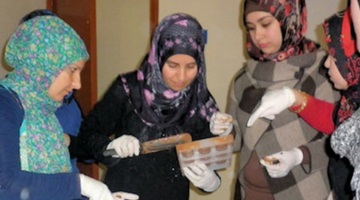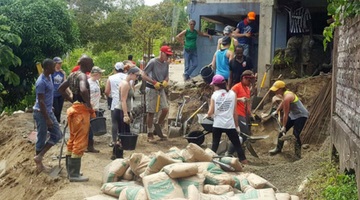From Syria to the stage: Diana’s story
Canada in Lebanon
Humanitarian Assistance
June 2018
Photo: Elias El Beam/Mercy Corps
For a generation of refugees that was feared “lost,” a theatre program in Lebanon brings hope.
“We headed onto the Death road. That’s what they called it.”
At school in Syria, Diana loved theatre class. When she stepped onto the stage, the pressures of real life would fade into the distance.
But as Syria’s brutal civil war escalated, Diana was forced to flee. She left behind the comforts of home and the stage, saying a heartbreaking goodbye to her home, her school, and her father.
Diana’s family, Palestinian refugees, had already uprooted once before in the search for safety. As she was leaving Syria in 2013, Diana knew she would likely never go back.
As they settled into safety in southern Lebanon, Diana’s family received the news they most feared, her father had died of a heart attack.
Diana’s father had been her role model, teaching her poetry when life in Syria was still peaceful. The news of his death crushed her.
Diana fought against depression, contemplating suicide and preparing to say a final goodbye to her mother and sisters.
As they tried to cope with losing both family and home, life in Lebanon no longer felt like an option.
Traveling the Death Road
Diana’s family had joined over 1 million other Syrian refugees in Lebanon, making up roughly a quarter of Lebanon’s pre-war population. Few jobs or basic services combined with local frustration towards the refugees often leaves the 200,000 Syrians between the ages of 10 and 17 in Lebanon with little hope for the future.
Like countless refugees before her, Diana left for Europe. She was 14 at the time.
“We headed onto the Death road. That’s what they called it,” Diana said.
“Living without my father and any source of income was impossible; we had to take our chances.”
But the road had not been named lightly. Diana was assaulted and arrested on her way to Europe and forced to return to Lebanon. Diana rejoined her mother, who was struggling to make ends meet. The United Nations Refugee Agency reports that 76% of Syrian refugee households are living below the poverty line, struggling to survive on less than US$3.84 per person per day.
As thousands of young refugees in Lebanon try to cope with this grim reality, fears have begun to spread of a “lost generation” of young people who have limited opportunities for education or employment.
For Diana, the dream of a life filled with writing, poetry and theatre had long felt out of reach.
Hope for the future
 After enrolling in a theatre class with “Youth for Tomorrow,” Diana is smiling once again. Photo: Elias El Beam/Mercy Corps
After enrolling in a theatre class with “Youth for Tomorrow,” Diana is smiling once again. Photo: Elias El Beam/Mercy CorpsCanada is dedicated to helping young people like Diana.
Over three years, the Canadian government has pledged $1.1 billion in humanitarian and development funding to help the most vulnerable people affected by the conflicts in Iraq and Syria.
The Government of Canada is funding the Mercy Corps led “Youth for Tomorrow” program in Lebanon as part of Canada’s commitment to help those in need. This program provides over 5,000 people aged 12 to 19 across Lebanon with access to safe community centres, where they can develop their life skills and receive the psychosocial support needed to gain self-confidence.
Earlier this year, “Youth for Tomorrow” reached out to Diana. Immediately, she registered for a theatre class.
“When I stepped on the stage, I forgot my depression,” she said. “I forgot jail, I forgot death and all the sadness and fear.” After two months of intensive theatre therapy, Diana’s confidence has grown; she began making new friends and was nominated to the program’s youth council.
“For me, theatre is the best place to express myself and get rid of my agony and all the darkness I’ve been through,” Diana said.
“I started seeing a better way of life through theatre, a light I didn’t see before.”
Related links
External resources
- Date Modified:



